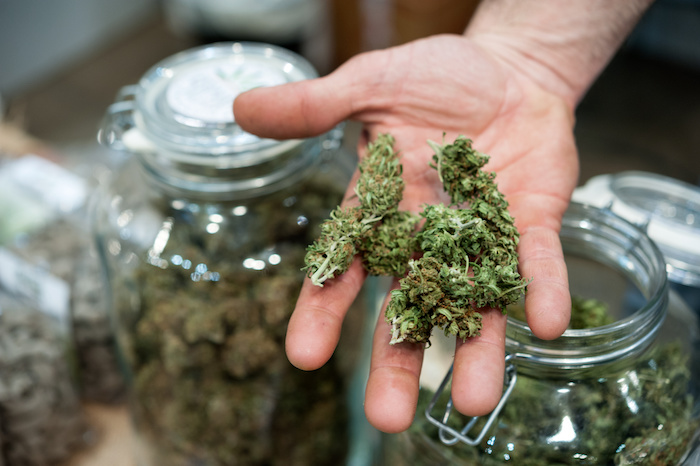News
BC dismisses calls to crack down on illicit pot shops
Published on June 25, 2021 by Don Plant

A recent study on contaminated weed has re-stoked calls for stiffer enforcement against scores of illegal shops selling cannabis in BC.
The province’s cannabis secretariat found 90 per cent of dry cannabis samples seized from six illicit stores in the Lower Mainland were tainted with pesticides and other harmful materials, prompting an outcry from legal retailers who complain the shops are still operating with impunity while consumers risk their health. The study results compound the frustration retailers feel competing on what they say is a playing field tilted against them as enforcement officers stand on the sidelines.
“The leniency and direction provided by the province with respect to enforcement has only emboldened the black market and perpetuated the risk to the public,” said one retailer who requested anonymity for fear of retribution.
Health Canada requires licensed cultivators to test cannabis to confirm it’s fit for consumption. Mike Farnworth, BC’s public safety minister, told a news conference this month all but two of the 20 samples seized also contained “unacceptable levels” of bacteria, fungi or heavy metals. Only three of the samples would have been fit for consumption if they were legal.
More than 50 unlicensed pot shops in the Okanagan
The BC government appears reluctant to crack down on the illegal cannabis trade, even though it created the legislation that regulates the industry. Critics say they’re seeing a proliferation of stores and more people getting into the business.
“I’m getting increasing pressure from the legal operators about the unfairness of the illegal operators . . . taking revenues away that might otherwise benefit their stores,” said Greg Kyllo, Liberal MLA for Shuswap and the Opposition’s cannabis critic.
“These illegal shops are . . . buying from organized crime or buying surplus that might be coming from medical cannabis growers. They’re breaching both federal and provincial statutes with respect to the sale of cannabis.”
Farnworth said more than 370 legal cannabis stores operate in BC and consumption of legal product is rising compared to illegal cannabis. Kyllo says he’s seen at least 20 illegal shops in his riding alone. One retailer estimates more than 50 illicit shops are operating in the Okanagan-Shuswap.
Officers with the Community Safety Unit have been increasing enforcement under the Ministry of Public Safety and the Solicitor General, said Farnworth. He wasn’t available for comment but in a statement said the goal for CSU officers has been to “encourage voluntary compliance” among illicit operators and warned those who continue operating illegally will face more enforcement action.
Kyllo doesn’t buy it.
“It’s not working, minister. There has not been a reduction. There has been an increase,” he said. “In the Shuswap riding, probably thousands like the idea of getting cheap cannabis product. But they don’t necessarily know the health risks that are associated with it.”
The government has begun “educating” commercial landlords about the consequences of allowing their properties to operate as illicit shops, Farnworth said. Licensed retailers grumble that nearly three years after legalization, the problem is worsening.
“Minister Farnworth’s comments are meaningless,” said one. “The government’s very involvement in policing illegal cannabis has in fact interfered with the ability of the RCMP and other policing agencies from doing their job.”
BC taking a softer approach with First Nations cannabis stores
Kyllo contends some illegal products contain carcinogens in soil additives that get absorbed into the plants to increase their weight and generate more revenue. Consumers don’t have certainty that the levels of THC and CBD on the labels are valid and are at greater risk of ingesting carcinogens.
“Nobody is monitoring this,” he said. “Who knows what people are buying? Who knows that what’s marked on the package is actually reality?”
CSU officers have the power to confiscate illegal product, apply fines and shut down stores. Instead, the government is directing them to take a softer approach, in part because many illicit shops are operating on First Nations land and being heavy-handed would conflict with the spirit of reconciliation, Farnworth said.
“We are committed to reconciliation with Indigenous Nations and we seek to do this by building positive relationships with Indigenous governments. The Community Safety Unit is taking an approach of communicating, educating and collaborating with Indigenous governments that have illicit retail locations within their territory,” he said.
Cannabis laws have the same force and effect over all lands in BC, said Kyllo. If government allows First Nations to sell cannabis under different rules, it should say so and transform the legislation.
Officers have the power to charge consumers holding illegal flower or edibles with possession of an illegal product. They could easily park a squad car outside a store and stop a customer leaving an illegal shop, Kyllo said.
“My guess is the first time you . . . start pulling people over and laying fines, the consumers really quickly are going to stop buying from those stores. But (they’re) not even doing that.”
Leave a comment on our Facebook page.
© Copyright 2021 Okanagan Z. | About the oz.
Report a Typo or Inaccuracy
We strive to avoid typos and inaccuracies. However, on occasion we make mistakes. We value your contributions and help in correcting them.